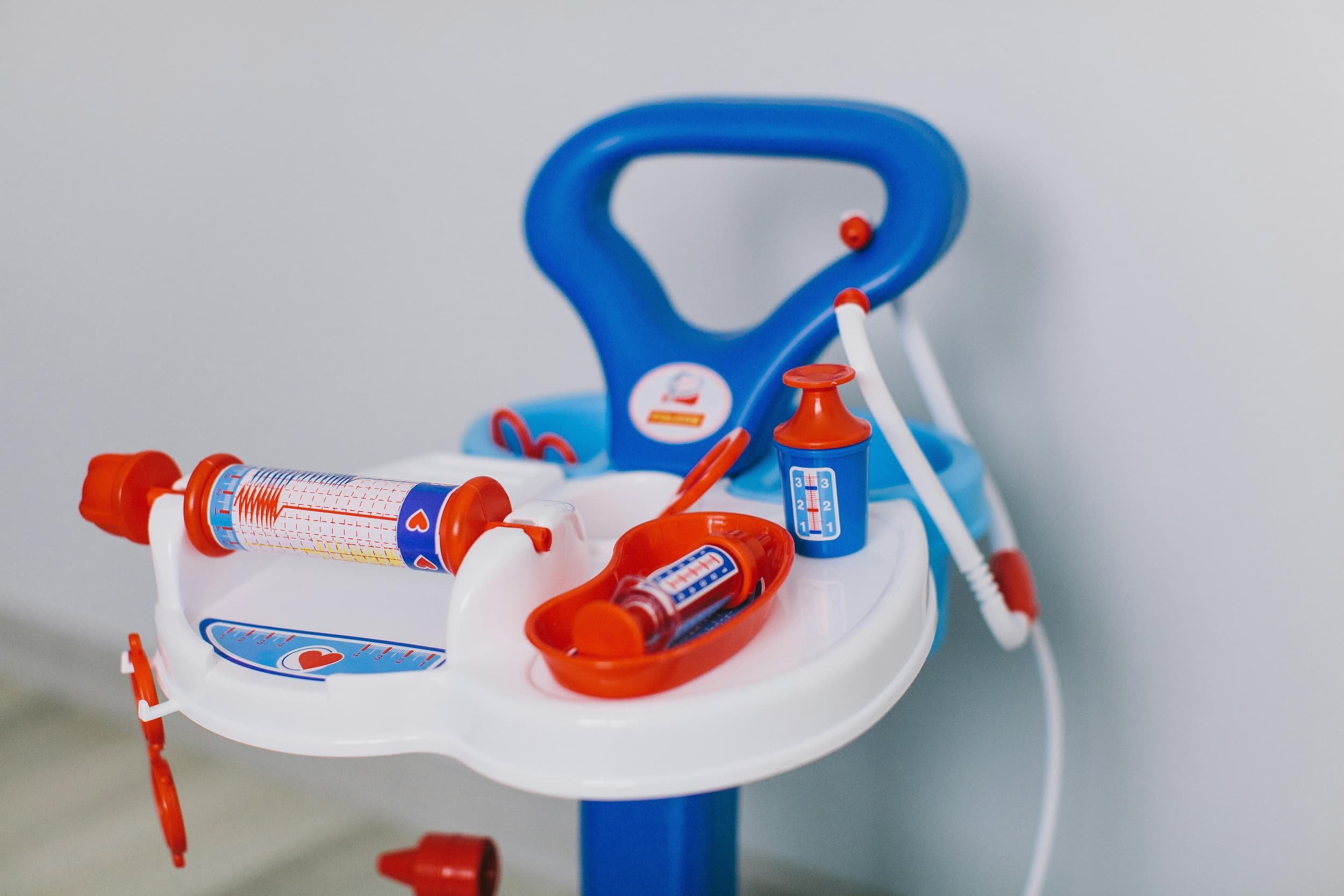
Paediatric Services
Comprehensive and holistic care for your child’s well-being
Whatever is troubling your child, I will undertake a complete review of your child’s health.
My holistic approach to paediatric care focuses on addressing the root causes of health concerns to support your child’s long-term growth, development, and well-being. With close connections to Great Ormond Street Hospital (GOSH) and a network of paediatric specialists, I am able to provide comprehensive solutions and coordinate specialised care whenever needed.
General Paediatrics
Working at one of the busiest paediatric departments in the country, I have developed a wealth of experience in general paediatric care, including developmental concerns, headaches, recurrent infections, poor growth, milk allergies and many other child health issues.
-
General child health checks include addressing specific health concerns, monitoring growth, development, physical examination, health advice and screening tests when needed.
-
20% of adolescents suffer from weekly headaches, and migraines are in the top five diseases in childhood. They can be very worrying for parents, especially when school attendance is affected. Primary headache disorders include migraine and tension headaches.
There are many treatment options, including non-medicine alternatives. -
Recurrent infections in children, especially toddlers, are common and usually part of normal development. Rarely, they can also be a sign of underlying conditions such as a primary immunodeficiency. This can be looked into with specific investigations.
-
Cow’s milk protein allergy affects around 7% of babies under one year of age. It occurs when a child’s immune system mistakenly recognises cow milk protein as a foreign invader.
Symptoms include eczema and gastrointestinal issues including vomiting, diarrhoea, abdominal pain and blood in the stools. There can also be general discomfort with fussiness and refusal to feed. This can be managed with dietary changes and the majority of children grow out of it with time. -
Child development refers to the physical, cognitive, emotional and social growth that occurs through a child’s life. It is divided into physical, cognitive, language and social-emotional development.
Growth refers to the length and weight of the child, which can be affected by many things including diet, genetics, malabsorption issues and other factors.
-
Eczema is a very common skin condition, affecting at least one in every five children. It causes the skin to become red, itchy and inflamed. It can be troublesome for babies and stressful for parents. There are treatments to control the symptoms, and get your child back to feeling themselves again.
Specialist Gastroenterology
I am the lead for gastroenterology at North Middlesex Hospital and specialise in constipation, acid reflux, coeliac disease, and other gastroenterological issues. I have built a close working relationship with the GOSH team should any further invasive investigations, such as endoscopy, need to be arranged.
-
Constipation is a common condition occurring in up to 30% of children, becoming chronic in more than a third of cases. Evidence shows that parents may delay seeking medical help due to worry about their concerns not being taken seriously.
Constipation can have both physical and psychological impact on children. It is easily diagnosed and managed with medication in most cases. -
Gastro-oesophageal reflux (GOR) is a normal physiological process that usually happens after eating in healthy infants, children and young people. In contrast, gastro-oesophageal reflux disease occurs when the effect of GOR leads to symptoms severe enough to merit medical treatment.
Signs can include arching of the back, abnormal movements of the neck and chin, irritability, loss of appetite or refusing to feed. Complications include poor weight gain, cough and wheezing. Diagnosis and management can be made in a clinical review. -
Coeliac disease (CD) occurs in 0.5-1% of the general population. It is a common immune mediated inflammatory process of the small intestine caused by sensitivity to dietary gluten and related proteins. It is not a food allergy. The appropriate treatment, once diagnosed, is a gluten free diet for life, which results in mucosal healing in most individuals.
Symptoms can include weight loss/failure to thrive, delayed puberty, chronic fatigue, chronic iron deficiency anaemia among other symptoms.
A recent change in guidelines means some children can be diagnosed on just a blood test, however some children might need an endoscopy.
-
Abdominal pain is one of the most common reasons for a child to see a doctor. It is pain or cramping anywhere in the abdomen.
Caused by many things, commonly it can be functional. It can, however, result in a lot of absence from school. If the pain persists for more than 24 hours, or there are other concerns it is worth seeking a medical opinion. -
Children with chronic diarrhoea pass loose, watery stool three or more times a day for at least four weeks. Causes include infections of the digestive tract, food allergies and intolerances, and digestive tract disorders.
-
Colic is a condition of recurrent and prolonged crying in an infant under five months of age without an obvious cause. Episodes often occur in the evening which can be particularly frustrating for exhausted parents. They usually peak at six weeks of age, and decline after 3-4 months. There are steps to lessen the severity and duration of these episodes.
Respiratory Medicine
As one of the paediatric respiratory leads, I help children dealing with asthma, chronic coughs and recurrent chest infections, among other issues.
-
Asthma is a chronic lung disease which occurs in around 1 in 11 children. It is caused by inflammation and muscle tightening around the small airways, making it harder to breathe. Symptoms can include coughing, wheezing, shortness of breath and chest tightness.
Treatment is a combination of acute reliever bronchodilator (salbutamol / blue inhaler) to open the air passages and relieve symptoms, and chronic preventative inhalers (steroid) which reduce inflammation in the air passages and reduce the risk of severe symptoms. A lot of children grow out of this condition. -
A chronic cough is one that lasts four weeks or longer in a child. It is important to establish first if it is wet or dry. A dry cough can be caused by post nasal drip, asthma or acid reflux amongst others. If wet, a condition called protracted bacterial bronchitis could be the cause. This can be treated with a prolonged course of antibiotics.
-
Regarded as greater than three episodes a year of documented bronchiolitis, bronchitis, or pneumonia. Chronic wet-sounding cough every day for more than four weeks also merits further investigation, as it could be protracted bacterial bronchitis. If accompanied by poor weight gain, then rare conditions such as primary immunodeficiency and cystic fibrosis need to be investigated, amongst other conditions.
-
Wheezing is characterised by narrowing of the lower airways and may be accompanied by a cough, fever and runny nose. At least two in five children have at least one episode of wheezing before they are six years of age, This can be caused by various factors.
Up to 30% of infants can develop wheezing in the first year of life due to small airways. Young children are susceptible to wheezing due to viral upper respiratory infections. Children with asthma and allergies may also experience wheezing. There are treatment options, if needed. -
Up to 50% of children in the UK suffer from allergies, with 4% of preschool children suffering a food allergy. An allergy is when the body has a reaction to a protein, such as food, insect sting, pollens, house dust mite or other substances. They can run in families.
Allergic symptoms can affect the nose, throat, ears, eyes, airways, digestion, and skin. It is not always clear what has caused the symptoms, since some allergic symptoms can be similar to common childhood illness. -
While present since birth, chest wall deformities might not become noticeable until children hit their adolescent growth spurt. The most common chest wall deformity, pectus excavatum, is a sunken breastbone. Another deformity is pectus carinatum, causing the breast bone to protrude out. Other causes can be extra rib or overgrowth of the cartilage. These can be investigated, and if impacting on respiratory function or the child’s confidence - operated on at specialist centres.

Get in Contact
If you would like support with any of these issues, or any other concerns regarding your child’s health, please get in contact and we can arrange an initial consultation.
